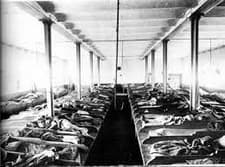
Workers sleeping in bunkers in a dormitory in pre-revolutionary Russia. They slept in shifts and could not keep their families with them.
With reference to the above image, analyse the divisions that existed among workers in pre-revolutionary Russia.


Important Questions on Socialism in Europe and the Russian Revolution
When the Bolsheviks ordered land redistribution, the Russian army began to break up. Soldiers, mostly peasants, wished to go home for the redistribution and deserted. Non-Bolshevik socialists, liberals and supporters of autocracy condemned the Bolshevik uprising. Their leaders moved to south Russia and organised troops to fight the Bolsheviks (the ‘reds’).
Examine the course of Civil war in Russia and the role of Bolsheviks in gaining control over most of the former Russian empire.
Army officials, landowners and industrialists were influential in the Provisional Government. But the liberals as well as socialists among them worked towards an elected government. Restrictions on public meetings and associations were removed. ‘Soviets’, like the Petrograd Soviet, were set up everywhere, though no common system of election was followed.
What were the key demands of Lenin's "April Theses," and how did these demands mark a significant shift in the Bolshevik agenda during the Russian Revolution?
A meeting has been called in your area to discuss the socialist idea of doing away with private property and introducing collective ownership.
What would you do at the meeting if you are:
- A poor labourer working in the fields
- A medium-level landowner
- A house owner
Imagine that you are a striking worker in who is being tried in court for your act of rebellion. Draft the note you would make in your defence.
Imagine that you are a middle-level wheat farmer in Russia after collectivisation. You have decided to write a letter to Stalin explaining your objections to collectivisation.
What would you write about the conditions of your life? What do you think would be Stalin’s response to such a farmer?
In the October Revolution of , the Bolshevik party took control in Russia, leading to the subsequent transformation of the party into the Communist Party of the Soviet Union.
Identify which of the following statements are NOT correct about the Bolsheviks.
I. Most industry and banks were nationalised in November by the Bolsheviks.
II. The Bolsheviks were totally opposed to private property.
III. It was led by Vladimir Lenin, the Bolsheviks seized power in Germany, marking the beginning of the Soviet era.
IV. They were a faction of the Russian Social Secret Labour Party.
